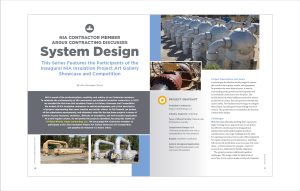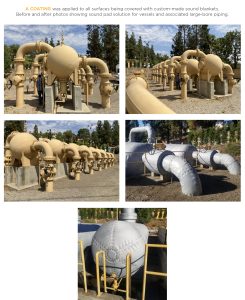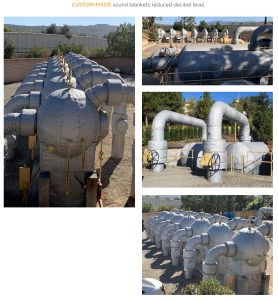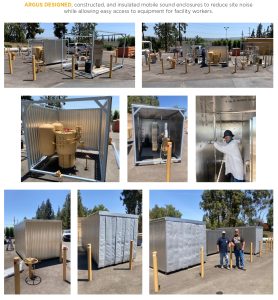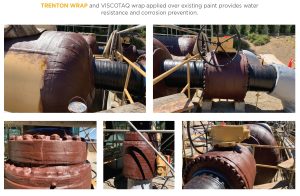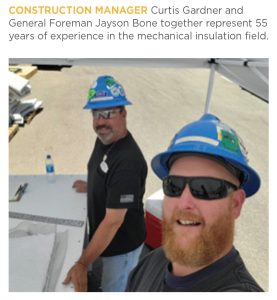NIA Contractor Member Argus Contracting Discusses System Design
NIA is proud of the professionalism, creativity, and artistry of our Contractor members. To celebrate the craftsmanship of NIA mechanical and industrial insulation contractors, in 2023 we unveiled the first-ever NIA Insulation Project Art Gallery Showcase and Competition. We invited all NIA insulation contractors to submit photographs and a brief description of projects representing their most creative and artistic efforts. At Fall Summit, we posted all the submissions anonymously, and attendees voted for the top three projects in terms of number of parts insulated, aesthetics, difficulty of installation, and well-installed application. As a new regular column, we will profile the projects submitted, focusing this month on 3rd Place Winner, Argus Contracting, LLC. We encourage NIA Contractor members to participate in the 2024 Insulation Project Art Gallery Showcase and Competition, and possibly be featured in a future article.
PROJECT SNAPSHOT
Insulation Contractor: Argus Contracting, LLC
Industry Segment: Industrial
Type of Plant/Facility: Natural Gas Distribution Facility
Temperature Range: N/A (Thermal protection was not a consideration for this project)
Region: Southern California
System Designed/Application Type: Sound Suppression and Corrosion Prevention
Project Description and Goals
A natural gas distribution facility sought to reduce the sound from its pipes, vessels, and equipment. In operation for more than 40 years, it saw the surrounding area’s growth and development lead to residential construction over the years. The facility had tried several different methods to reduce production acoustics, but each previous attempt was unsuccessful. The facility turned to Argus to mitigate the problem. Another goal was providing corrosion control. This project was not undertaken for thermal control of the facility.
Challenges
With this type of facility, shutting down operations while working out an approach was not an option. An effective solution had to be designed and implemented while addressing key practical considerations. One large challenge was the need for ongoing and easy access to parts of the equipment for regular inspection and maintenance. Anything left uncovered would allow noise to escape, but some items—actuator valves, for example—had to be accessed on a daily basis by facility employees.
The project presented additional logistical challenges. The design called for fabrication of
more than 1,000 custom-made sound pads. Expertise was required not only to accurately fabricate the pads to fit the application, but also to cut them in such a way as to minimize material waste.
Finally, the overall solution needed to provide corrosion protection for the surfaces being covered, which already had a layer of paint 6 to 12 mils thick. Simply putting sound blankets atop the existing painted surfaces was not a viable option for long-term corrosion protection, as existing damage and scratches through painted surfaces could allow moisture to come into contact with bare metal, leading to rust.
Craig Skeie, Western Region President of Irex Contracting Group, LLC, Argus’ parent company, visited the site with Argus Construction Manager Curtis Gardner and General Foreman Jayson Bone. They walked the site to assess project requirements and to formulate a plan, which Skeie put together for the client’s approval.
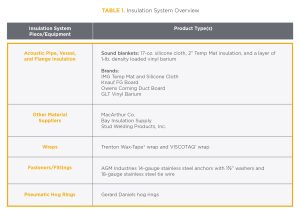
Noise Reduction
The team started with the vessels, as they made the majority of the noise, working through the larger bore piping next, and so on. To achieve the customer’s noise reduction goals, Argus selected sound blanket materials that provide good sound attenuating properties, installing 17-ounce silicone cloth, 2” Temp Mat insulation, and a layer of 1-lb. density loaded vinyl barium. Temp Mat is a bonded glass fiber blanket that absorbs sounds and resists vibration. Barium sulfate vinyl high-density barriers are commonly used to reduce sound travel from pipes, as well as through floors and walls, and from air ducts. The insulation was held in place with 14-gauge stainless steel anchors and 18-gauge stainless steel tie wires. Table 1 provides a summary of products used in the insulation system.
Gardner explains that they completed one sphere assembly first as a test case, making sure the approach gave them the results they wanted. They then “mass produced” the rest of the job following the successful test case.
Gardner and Bone oversaw the coatings and custom fabrication and installation of the pads, primarily fabricated off site, although additional customization occurred on the jobsite for some components. Fabrication, coating, and installation all were performed in assembly-line fashion, which was practical as well as efficient. Just the weight and bulk of all the fabricated materials made transporting them to the jobsite all at once prohibitive, for example, and then there would have been concerns over storage.
Allowing Access for Employee Maintenance
Although the sound pads would typically be sufficient to mitigate noise, the facility has many pieces of equipment that need to be accessed on a daily basis—e.g., ports/gauges for workers to check flows. Leaving them uncovered was not an option. Gardner explains it is the nature of sound to transmit, so “muffling it in one part forces it to another,” where it will escape. The team opted not to use the same approach on these items as on the equipment/piping. Argus did not want to risk the likelihood that sound pads would be removed and then left off for employee convenience during their daily checks. Gardner and Bone decided to go bigger and insulate a space around the existing equipment for the employees to work. They came up with the idea of designing and installing mobile sound enclosures around the equipment that workers needed to access frequently. They built the enclosures—essentially sound-proofed boxes—welding and attaching the sound-proofing to the inside of each of the enclosures. They were designed to be rolled out of the way if needed (hence the term “mobile sound enclosures”), with removable tube steel and box rib. The enclosures were lined with 2” duct liner board, with sewn door flaps that were loaded vinyl with silicone cloth, and installed over instrumentation, actuator valves, and other pieces of equipment that needed to be accessible, giving workers the ability to get in to check gauges, etc. as often as they needed.
Corrosion Control
To tackle this challenge, the team applied Trenton wrap and VISCOTAQ wrap over the existing paint to provide water resistance and corrosion prevention, ensuring the approach worked with the owner’s existing specifications. They used a coating designed to be used underground. As Skeie explains, “The owner’s engineers recommend if pads are installed on metal surfaces, their specification for underground work needs to be followed. Applying Trenton wrap and VISCOTAQ wrap yields a coating that is between 70–90 mils thick, compared to the above ground paint being only 6–12 mils thick. Both wraps have a self-sealing property, so if the surface is scratched or damaged, the wrap seals itself, whereas if you scratch paint, it doesn’t fix itself… The breach migrates along the pipe and you have a problem.” The layer of coating also contributes to overall sound reduction, although that is not its primary purpose here.
Added Value of Experience
Because the project was designed to address acoustics, rather than thermal properties, the client needed a mechanical insulation contractor experienced with both the design goal and this type of facility. They reached out to Argus because the company had done mechanical insulation projects for them in the past, with a solid working relationship going back more than 20 years. Long relationships are not new to Argus. Gardner comes from a family of mechanical insulation professionals. With his 35 years, his father’s 37, and his older brother’s 40 years, the Gardners represent more than 100 years (112, to be exact) of expertise in, and service to, the industry. While the first in his family to pursue the profession, Bone brings an impressive 20 years of experience to his work. Craig Skeie asserts that in addition to representing their company well, both men are “a great asset to Local 5 and the industry.” The decades of experience of Gardner and Bone allowed their team to image, design, and craft an innovative solution the mobile sound enclosures. They worked alongside Raul Alvarez, Rafael Castro, John Harrell, Andy Madrid, and Doug McGill, also members of Local 5 of the Heat and Frost Insulators and Allied Workers Union.
Mechanical Insulation Contractor as Consultant
This project is a perfect example of how an experienced mechanical insulation contractor can serve as a consultant, applying knowledge and creativity to solve customer problems. Argus was not only able to address the noise reduction goal, but also did so in a way that met the requirement for facility workers to have easy, continuous access to the parts of the system they needed. At the same time, Argus ensured its solution would last, providing corrosion protection wrap on steel surfaces, covered by custom UV and weather-resistant removable covers.
The End Result
From start to completion, the project took Argus just under 4 months. When sound experts measured decibel levels coming from the facility after the work was finished, they found the noise was significantly reduced. “Our client was happy with the outcome,” concludes Skeie.
Argus was able to turn the challenges of a large, complicated project into an opportunity to make a positive difference for its customer and for the surrounding community.
About Argus Contracting, LLC
Argus Contracting is a company of the Irex Contracting Group, an organization that consists of a parent service corporation and an affiliated group of specialty contracting companies operating throughout the United States that provide services including installation and maintenance of mechanical insulation; sheet metal lagging; architectural finishes; passive fire protection; energy audits; and the removal and abatement of asbestos, lead-containing materials, mold, and other hazardous materials. An expanding number of other services are also provided where complementary to these core businesses. As a prime contractor or a subcontractor, Irex contracting companies provide new construction and maintenance services to commercial, industrial, marine, and insurance markets. Contracts include all types of office, residential, and institutional buildings; manufacturing facilities; power plants; process plants; and other heavy industrial installations. The group also provides Certified Energy Appraisers, Certified Infrared Thermographers, a Quality Assurance/Quality Control Program in compliance with NQA-1 and ISO-9001, and Certified LEED Professionals. For more information, visit https://www.arguscontracting.com.
NIA congratulates 2023 competition winners:
First Place: Elite Insulation, Inc.
Second Place: Thermal Solutions, Inc.
Third Place: Argus Contracting, LLC
We thank all the entrants who helped highlight the diversity and creativity of the mechanical insulation industry:
- DKB, Inc.
- Gribbins Insulation Company
- Hudak’s Insulation Inc.
- I&I
- Kerco, Inc.
- Luse Thermal Technologies
- Performance Contracting, Inc.
- Taurus Insulation, LLC
- Texoma Industrial Insulation, Inc.
Watch for future articles with details on other projects submitted.

